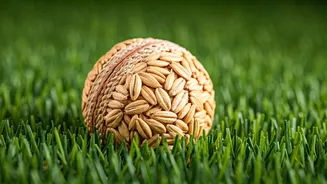Oats: The Powerhouse Grain
Oats, scientifically known as Avena sativa, are more than just a breakfast staple. They are a whole-grain powerhouse, rich in essential nutrients. One
of the key benefits lies in their high soluble fiber content, especially beta-glucan. This type of fiber is known to lower LDL cholesterol, often called "bad" cholesterol, which significantly reduces the risk of heart disease. Oats also provide a good source of complex carbohydrates, offering sustained energy release and helping to prevent those energy crashes. Furthermore, oats contain antioxidants that combat inflammation and protect cells from damage. These attributes make oats a versatile and valuable addition to a balanced diet, suitable for individuals across different age groups and lifestyles in India.
Heart Health Champion
The remarkable impact of oats on heart health stems from their beta-glucan fiber content. This soluble fiber forms a gel-like substance in the digestive system, which binds with cholesterol and prevents its absorption. Studies have shown that consuming oats regularly can help lower total and LDL cholesterol levels. A 2014 study published in the 'Journal of the American College of Nutrition' suggested that incorporating oats into a diet could reduce the risk of cardiovascular diseases. Oats also contribute to improved blood pressure management, providing an added benefit for overall heart health. These properties are particularly relevant in India, where heart disease is a leading health concern. Introducing oats into your daily diet is a proactive step toward maintaining a healthy cardiovascular system, potentially mitigating the risk factors associated with heart-related ailments.
Aiding Weight Management
Oats can be a significant ally in weight management strategies. Their high fiber content promotes satiety, meaning they keep you feeling fuller for longer. This can help reduce overall calorie intake and prevent overeating. The slow-digesting complex carbohydrates in oats also contribute to stable blood sugar levels, preventing spikes and crashes that can trigger cravings. Additionally, oats have a relatively low-calorie density, allowing for a substantial portion size without excessive caloric intake. For those in India aiming to shed extra pounds or maintain a healthy weight, incorporating oats into breakfast or snacks can be a valuable approach. This could involve enjoying a bowl of oats with fruits, nuts, or even savory preparations. Such practices can support weight loss goals while ensuring the intake of essential nutrients and offering a satisfying eating experience.
Sustained Energy Source
Unlike refined grains that quickly release energy, leading to a rapid rise in blood sugar, oats provide a sustained energy release due to their complex carbohydrate structure. This helps prevent energy crashes and keeps you feeling alert and focused throughout the day. The fiber content further aids in slowing down digestion, which contributes to a consistent supply of glucose to the bloodstream. This stable energy level is especially beneficial for those with busy schedules or physically demanding jobs. Whether you are a student, working professional, or homemaker in India, starting your day with oats can provide the energy needed to tackle various tasks and activities. The slow-release nature of oats makes them an excellent choice for a long day.
Versatile Culinary Uses
One of the great advantages of oats is their adaptability to various culinary styles, making them suitable for the diverse tastes of India. While the traditional porridge is a popular option, oats can be creatively incorporated into a range of dishes. They can be added to upma, idli batter, or dosa batter to increase fiber and nutritional content. Oats can also be used as a binding agent in vegetable cutlets or patties. Furthermore, oats can be enjoyed in savory preparations with spices and vegetables, adapting well to regional flavors. With creative uses, oats can become a staple in many Indian households, fitting seamlessly into breakfast, lunch, or dinner. You can experiment with incorporating them into your favorite dishes.
Choosing the Right Oats
Navigating the options in the market may feel overwhelming. There are several types of oats available, each offering a slightly different texture and cooking time. Rolled oats, also known as old-fashioned oats, are a popular choice due to their versatility and moderate cooking time. Quick-cooking oats are processed further and cook faster, suitable for time-crunched mornings. Steel-cut oats, which are less processed, take longer to cook but offer a chewier texture and a lower glycemic index. For Indian consumers, the choice depends on personal preferences and meal planning. Consider your desired texture and cooking convenience. Read labels carefully to check for added sugars, salt, or artificial flavors, and choose varieties that are as close to their natural state as possible to maximize health benefits. It's often beneficial to choose whole-grain options to ensure maximum nutritional intake.












